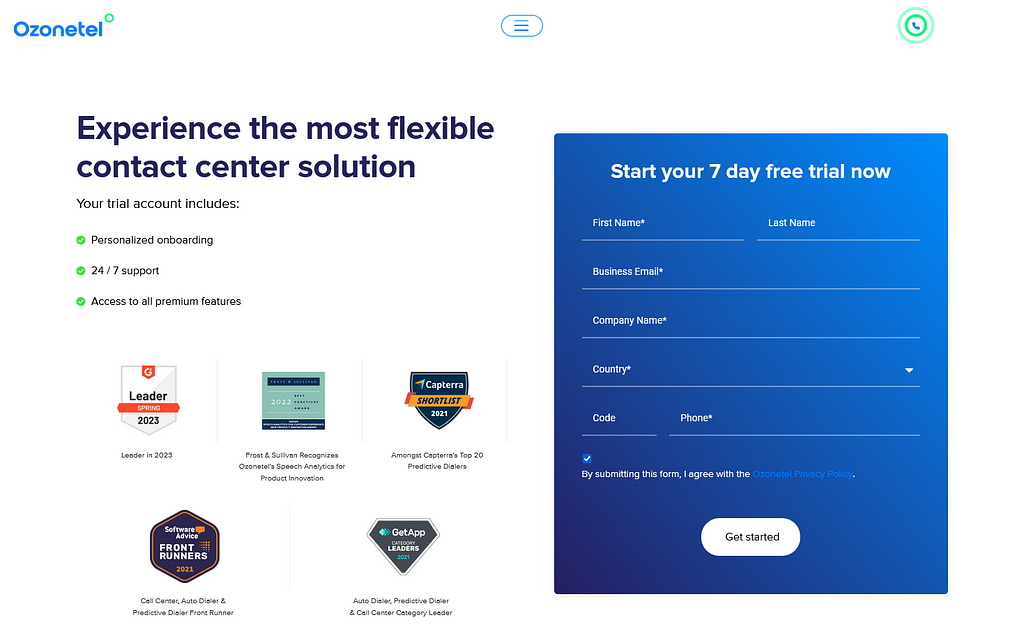- Resources
- 5 Practical Ways to Build More Meaningful Patient Relationships in 2024 and Beyond
5 Practical Ways to Build More Meaningful Patient Relationships in 2024 and Beyond

In the dynamic landscape of healthcare, patients are more empowered than ever before. They have access to more information about their conditions and treatment options, and they are more likely than before to shop around for the best care.
However, beyond accurate diagnoses and effective treatments, patients seek a sense of understanding, compassion, and trust from their healthcare professionals. The concept of patient relationships has extended beyond the clinical encounter, encompassing every interaction that contributes to the patient’s journey within the healthcare system.
According to a global survey of nearly 6,000 healthcare consumers:
- 82% say they would switch providers as a result of a bad experience.
- 83% say it’s important that providers know them personally.
- 61% say it’s very important for providers to offer easy access to healthcare records.
- 48% select a provider based on word of mouth & 31 % select based on online reviews.
1. Mastering Empathy in Communication
Empathy forms the cornerstone of a meaningful patient-provider relationship. Your healthcare advisors must excel at effective communication, characterized by active listening, non-judgmental responses, and emotional validation.
Several studies have cited that empathetic communication leads to improved patient satisfaction and adherence to medical recommendations.
According to research from The BMJ, communication breakdowns were responsible for 55% of patient complaints in Australia. The study highlighted that patients frequently experienced feelings of being neglected, disregarded, or undervalued by their healthcare providers.
Active listening is a must for healthcare advisors so patients have ample time to express their concerns and ask open-ended questions. They should use verbal and nonverbal cues, such as eye contact and nodding, to demonstrate engagement and understanding. Overall, they must validate the patient’s emotions and experiences to create a safe and supportive environment.
2. Cultivating Trust Through Consultative Care
Trust is an essential element in enduring patient relationships. Trust is built over time through consistent, reliable, and transparent interactions. healthcare firms must adopt a consultative care approach empowering patients to actively participate in their healthcare decisions and promoting a sense of ownership.
A case in point is a study published in the National Library of Medicine which highlights 81% of patients believe that shared decision-making with healthcare providers improves their overall care experience.
The action plan for healthcare providers in 2023 and beyond is to involve patients in their treatment plans by explaining options, risks, and benefits in a clear and understandable manner. They must train everyone from healthcare advisors, staff, and doctors to address any questions or concerns the patient may have about their diagnosis, treatment, or medications. A meaningful partnership then must be fostered by encouraging patients to share their preferences and goals, aligning the care plan with their values.
3. Enhancing Conversational Continuity
A fragmented healthcare journey can hinder the development of meaningful patient relationships as poor care coordination contributes to adverse events and medical errors, impacting patient outcomes and experiences.
Conversational continuity involves maintaining consistent and coordinated communication across various healthcare providers and settings. This approach ensures that patients receive comprehensive care and feel supported throughout their healthcare journey.
Healthcare providers must leverage electronic health records (EHRs) to facilitate seamless information sharing and communication. They must implement regular follow-up appointments to assess progress, address concerns, and make necessary adjustments to the treatment plan. Encouraging patients to actively communicate changes in their health status, medications, or treatments will ensure accurate and up-to-date information.
4. Personalizing Patient Interactions
Every patient is unique, and tailoring interactions to individual preferences can significantly enhance the patient experience. Personalization involves understanding the patient’s background, cultural beliefs, and values to create a more customized and relatable healthcare journey.
Various studies highlight that personalized care improves patient engagement and satisfaction, leading to better treatment adherence.
A nuanced approach that healthcare providers can adopt is to ask about the patient’s personal and cultural background to understand their perspectives and preferences. Use the patient’s preferred name and engage in conversations that resonate with their interests and experiences. Also, consider the patient’s lifestyle and circumstances when developing treatment plans, taking into account their daily routines and responsibilities.
5. Embracing Technology for Patient Engagement
The integration of technology in healthcare can enhance patient engagement and facilitate meaningful interactions. Tools such as patient portals, telemedicine, and mobile apps offer patients convenient access to information and communication with healthcare providers.
Healthcare providers must implement secure patient portals that provide access to medical records, test results, and treatment plans, allowing patients to stay informed and engaged in their care. Leveraging telemedicine for virtual consultations would enable patients to receive timely medical advice and guidance without the need for in-person visits. They can proactively recommend reputable health-related apps that empower patients to track their health metrics, monitor medications, and access educational resources.
Conclusion
Technology in healthcare will undoubtedly make it easier for healthcare firms and hospitals to make patient relationship management more personalized and convenient. But it’s crucial to remember that the only constant that can’t be interchanged is still the human touch.
Building meaningful patient relationships are imperative for providing high-quality care. By training your staff to be more empathetic, cultivating trust through consultative care, ensuring conversational continuity, personalizing patient interactions, and embracing technology, healthcare providers can create a patient-centered environment and improve health outcomes.
Businesses need to leverage technology that helps them to keep a pulse on patient sentiment, automate and streamline repetitive tasks, and equip their teams with the knowledge they need to create meaningful conversations.
How Ozonetel Can Help
Ozonetel’s AI-powered omnichannel solution enables healthcare providers to build seamless, fast, personalized communications necessary for improving patient relations. Built on three pillars – AI & automation, omnichannel routing, and deep integrations – Ozonetel’s improves your teams’ performance. Our solution offers intelligent routing to healthcare advisors, helping them connect with patients on multiple channels and easily access all the information they need to form long-lasting patient relations and 36% higher satisfaction.
Ready to take control of your call transfer
experience for better CX outcomes?
Frequently Asked Questions
Building a strong and lasting relationship with a patient is a delicate process that revolves around trust, empathy, and effective communication. By truly listening to their concerns, showing genuine care for their well-being, and offering clear insights about their health journey, healthcare providers can nurture meaningful connection with patients.
At the heart of patient relationships lie three essential elements: trust, mutual respect, and consistent communication. Trust stems from transparent medical information and a history of reliable care. Mutual respect fosters an environment where patients feel valued and understood. Consistent communication ensures patients are informed and active participants in their healthcare journey.
o build strong relationships with patients is of immense value for healthcare providers. It creates a foundation of trust that enhances treatment outcomes. Patients who feel respected and understood are more likely to openly share their health concerns, leading to accurate diagnoses and effective treatment plans. Moreover, positive patient relationships improve compliance, satisfaction, and overall well-being, reinforcing the importance of a compassionate and holistic healthcare approach.
Prashanth Kancherla
Chief Operating Officer, Ozonetel Communications
Over the past decade, Prashanth has worked with 3000+ customer experience and contact center leaders...
Chief Operating Officer, Ozonetel Communications
Over the past decade, Prashanth has worked with 3000+ customer experience and contact center leaders to comprehensively understand the need for effective and efficient customer communications at every step of their journey with a brand. Deeply embedded in today’s CCaaS ecosystem, he has been instrumental in Ozonetel's growth and contributed in various roles including product management, sales, and solution architecture.







